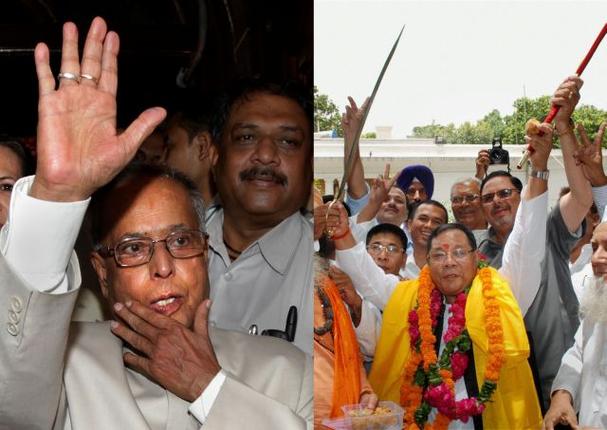
New Delhi, June 28: UPA nominee Pranab Mukherjee and NDA candidate P.A. Sangma on Thursday filed their nomination papers for the July 19 presidential elections in the presence of a host of leaders from both the sides.
Pranab Mukherjee was accompanied by prominent leaders in the UPA and other parties including Prime Minister Manmohan Singh and Congress president Sonia Gandhi. Mr. Mukherjee handed over his nomination papers to Vivek Kumar Agnihotri, Rajya Sabha Secretary General and Returning Officer for the Presidential elections.
Soon after completing the process, Mr. Mukherjee thanked parties like SP, BSP, JD(U), CPI(M) and Shiv Sena for reposing faith in him.
“I am grateful to them as they have reposed faith in me to occupy the office which was occupied in the past by great stalwarts of this country.
“I only wish at this time that let me have the blessings of God and cooperation of all at this juncture,” he told reporters at the Parliament House.
Four sets of nomination papers, signed by as many as 480 MPs and MLAs, including Union Ministers, Chief Ministers, Congress Legislature Party leaders and PCC chiefs were submitted by Mr. Mukherjee.
Convenor of the opposition NDA and JD(U) President Sharad Yadav was the first signatory on one set of nomination papers followed by Defence Minister A.K. Antony. Samajwadi Party chief Mulayam Singh Yadav and BSP supremo Mayawati have also signed the nomination papers.
As a matter of abundant precaution, each set of nomination papers have 60 proposers and 60 seconders against 50 proposers and 50 seconders as required under election rules.
SP supremo Mulayam Singh Yadav, RJD chief Lalu Prasad, RLD chief Ram Vilas Paswan, Congress general secretary Rahul Gandhi and union ministers such as P Chidambaram, Farooq Abdullah, Ajit Singh, E. Ahamed, A.K. Antony, Pawan Kumar Bansal, Ashwini Kumar were present at the time of Mr. Mukherjee filing his nomination papers.
As expected, UPA ally Trinamool Congress, which has decided not to back Mr. Mukherjee, was not present.
SP leader Ram Gopal Yadav, BSP leader Satish Chandra Mishra, NCP leader D.P. Tripathi were among others who witnessed the filing of nomination papers.
Parliamentary Affairs Minister Pawan Kumar Bansal has been appointed as Mr. Mukherjee’s authorised representative.
'Victory of tribal unity'
National Democratic Alliance (NDA) presidential candidate P.A. Sangma filed his nomination papers on Thursday, terming it a “victory of tribal unity”.
Odisha Chief Minister Naveen Patnaik, Punjab Chief Minister Parkash Singh Badal, Goa Chief Minister Manohar Parrikar, BJP president Nitin Gadkari and party leaders L.K. Advani, Sushma Swaraj and Arun Jaitley were among those who were present at the Rajya Sabha secretariat for the filing of the nomination.
“Today is a victory of tribal unity, that a tribal is filing his nomination for the post of President,” Mr. Sangma told reporters ahead of submitting his papers to the Rajya Sabha secretary general, V.K. Agnihotri, the returning officer for the election.
“I will file my nomination today as a candidate sponsored by the Tribal Forum of India, nominated by the Chief Ministers of Odisha and Tamil Nadu and backed by BJP and other NDA allies.”
Mr. Sangma also lamented that the Congress did not welcome the candidature of a tribal for the post of President despite the community having stood by the party.
“We wanted to express that tribals in India have all along stood by the Congress. We had expected Congress would welcome our request. However, the Congress did not come out in support of tribals,” he said.
“We sought an appointment to meet Congress chairperson (Sonia Gandhi). We were asked to wait in the Central Hall (of Parliament) consecutively for three days. We could not get an appointment. We then met other leaders,” Mr. Sangma added.





Comments
Add new comment